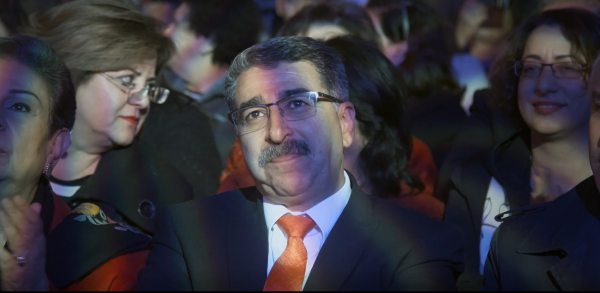

This fascinating documentary takes place in the West Bank city of Ramallah, which, as we learn from the opening credits, is an epicenter of Palestinian culture on the rise. Its mayor, Musa Hadid, appears more paternal than dynamic as political figures go. He’s bespectacled, stocky, past middle age, and not the most charismatic presence. Yet another adjective that describes him is steady, and the point director David Osit makes is that consistent, reliable leadership is underrated.
Early on, Hadid attends a staff meeting in which the topic is WeRamallah, the new marketing slogan that is part of a re-branding attempt for the city, but the discussion is deadpan funny as the concept clearly flies over Hadid’s head. He’s much more comfortable discussing the upcoming Christmas celebration, which is to feature multiple Santa Clauses rappelling down the fronts of buildings, and dealing with more run-of-the-mill problems, like replacing old doors at a public school.
But larger forces are at work that will have profound effects on Palestine and, subsequently, Hadid. Following President Donald Trump’s 2017 recognition of nearby Jerusalem as Israel’s capital, tensions with the Israeli soldiers around Ramallah rise. Hadid is adamant about staying focused on municipal services over geopolitics, but the two inevitably collide. A running story line involves sewage backing up into the streets; the city needs a sewage treatment plant, which isn’t possible because Israel currently controls the water supply.
Hadid also gets asked by international rights organizations about hosting talks between Palestinian and Israeli leaders, which culminates in a rare moment when he loses his cool and lists the abuses Ramallah has suffered under the occupation. He’s no doormat, and in fact, some of the film’s most satisfying moments occur when he pushes back against the West, quizzing European visitors as to whether anyone in their home countries knows what has been happening here. Hadid also travels abroad and is well received as a speaker, but he never looks as comfortable on the world stage as when he performs his mayoral duties.
The push and pull between trying to carry out his job and dealing with international politics continues, although it’s interrupted by a genuine crisis when Israeli troops storm part of the city. These are the most intense scenes as Hadid and some of his entourage find themselves at the center of the action. He impressively keeps his composure and even rises to the occasion when someone nearby is in distress.
Mayor has a few moments of sentimental scoring reminiscent of Ennio Morricone, but it’s otherwise devoid of non-diegetic music, which, instead of being off-putting, draws the viewer into the (normally) sedate rhythms of its setting. While the narrative centers on Hadid, it’s Ramallah that might benefit the most from the film, with its frequent cutaway shots to the city’s airy public squares, attractive outdoor cafes, and vibrant nightlife. The aforementioned Christmas celebration actually underscores an important point: the majority Muslim population and the local Christians seem to co-exist just fine.
Ultimately, the film isn’t too biographical as we never learn anything about Hadid’s political career before he became mayor, and both he and his staff members remain distant figures to the end, although there is a sense of Hadid’s leadership style, which is definitely more substance than style. But in the current era of ego-driven aspiring autocrats, that’s a welcome sight. Audiences who have forgotten how no-drama leaders behave may find Mayor inspiring viewing.






Leave A Comment